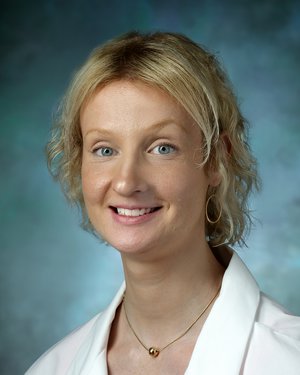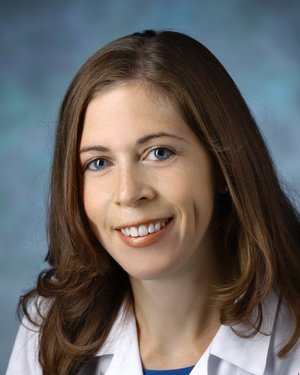Jennifer Thorne, MD PhD

- Chief, Division of Ocular Immunology
- Professor of Ophthalmology
Expertise: Uveitis
The Ocular Immunology and Uveitis Fellowship Program at the Wilmer Eye Institute was established in 1989 and participates in the Ophthalmology Fellowship Match Program.
This Fellowship program offers one-year of clinical training devoted to the medical and surgical management of uveitis and related ocular inflammatory diseases. An optional second year devoted to research pursuits is also available.
In addition, there is an option for extensive training in clinical research leading to an advanced degree, which can be funded through a K award from the National Eye Institute (NEI). The flexibility of this fellowship allows for successful transition into academic or private practice. Of our fellowship graduates, the majority currently hold appointments as faculty in academic departments of ophthalmology.
As a fellow in ocular immunology at the Wilmer Eye Institute you will spend five days each week caring for uveitis patients either in clinic or in the operating room. You will get a diverse exposure into ocular inflammation and infection, diagnosing and treating patients with uveitis, scleritis, mucous membrane pemphigoid, orbital inflammation, and other ocular inflammatory diseases. You will get to work with in the clinics with attendings that come from diverse backgrounds and will give multiple different perspectives on how to manage uveitis. The clinics will give you a broad field of exposure to patients with anterior, intermediate, posterior and panuveitis, as well as scleritis and orbital inflammatory diseases.
During the fellowship you will become comfortable in the medical and surgical management of ocular inflammatory disease and are exposed to all modalities of treatment of ocular inflammation including topical, periocular, intravitreal and oral corticosteroids, non-steroidal anti-inflammatory drugs, immunosuppressive agents, antiviral agents, and biologics.
In addition to patients with ocular inflammatory disease, the division sees patients that are HIV infected and that have undergone bone marrow or solid organ transplants that may develop either infectious or inflammatory anterior and posterior segment complications. As such, the fellowship affords the opportunity to gain experience with the treatment of a diverse array of infectious uveitides, including retinitis from cytomegalovirus and other herpesviruses.
Surgical experience includes cataract surgery in patients with uveitis. Training also focuses on the effective pre-operative and post-operative management of patients with uveitis and in office procedures such as biopsies, anterior chamber paracentesis, and periocular, intravitreal and suprachoroidal injections. Eligible fellows may have the option of taking trauma call on selected weekends with the residents.
The fellow will be heavily involved in clinical research throughout their fellowship year. Our faculty participate in large multicenter trials that are active at Wilmer. In addition to the large multicenter prospective studies, the rich history of research and a clinically busy division affords countless opportunities for retrospective or smaller prospective studies of ocular inflammatory disease.
Finally, there are numerous opportunities for teaching throughout the year. In addition to helping with formal lectures and grand rounds (see didactics below), you will also have the chance to teach residents and medical students informally as they rotate through the ocular immunology clinic and consult with you on ocular immunology patients seen on call.
*Other times where the fellow may operate dependent upon patient volume
Patients are seen in the ocular immunology five days a week. Fellows will be responsible for evaluating new patients including creating a differential diagnosis and a treatment plan under the supervision of the attending, and will learn the long-term management of patients with chronic ocular inflammation. While treatment for these immune-mediated disorders is largely medical, there is ample opportunity to perform procedures including subtenon corticosteroid injection, intravitreal injection of pharmacologic agents, anterior segment diagnostic paracentesis, and biopsy of external lesions. Anterior segment surgery, including cataract surgery, as well as placement of pharmacological implants is performed.
A second year in the fellowship may be devoted to either clinical or laboratory research. Fellows pursing clinical research will be taught approaches to epidemiologic studies and/or clinical trials, including the use of appropriate statistical techniques. Fellows are encouraged to identify a preceptor and begin planning the project in their first year so that applications for financial support can be submitted well in advance of the start of the actual project. Projects in other divisions, in other departments, or in the School of Public Health, may be developed as well. Faculty are happy to discuss current research studies during applicant interviews. Smaller projects may be undertaken within the first year of the fellowship and is based on fellow interest.
There is a multitude of opportunities for didactic learning during your fellowship. There is a monthly uveitis case management conference with division faculty, as well as faculty members from other divisions with an interest in uveitis. Optional lectures include a “grand rounds” on Thursday mornings that you will present at twice in the year. There is a weekly retina case conference that the uveitis fellow is welcome to attend. Finally, there is a monthly lecture for uveitis fellows across the country.
Fellows are evaluated by the program director quarterly. Each faculty member will submit an evaluation of the fellow commenting on and rating the fellow’s clinical and administrative capabilities (e.g., history taking, patient examination, surgical skills and timeliness of returning patient calls and dictating notes), teaching and presentation skills, and interactions with patients and colleagues. The program director will summarize these evaluations and discuss them with the fellow, identifying strengths and areas for improvement.
Applicants should have satisfactorily completed an accredited residency program, preferably within the United States, prior to starting this fellowship. The Uveitis Fellowship is part of the formal Ophthalmology Fellowship Match Program (OFMP).
If you have fulfilled an ophthalmology residency, please register for the match at www.sfmatch.org and complete the Central Application Service form, which requires three letters of recommendation (we prefer one from your current program director) and a personal statement explaining your interest in the program. Please include any research interests that you may have in your CAS personal statement. Additional information (if deemed essential to the candidate’s application) may be forwarded to Dr. Thorne at the address below with a cover letter that includes the applicant’s match number and the dates of the fellowship for which the applicant is applying.
An interview is required and typically takes place between late September and November for the fellowship year beginning in July of the following year.
Only the applicants with complete files will be invited for an interview.
Accepted fellows who have trained in the United States may be eligible for a faculty appointment through the Advanced Subspecialty Training Program (ASTP). This more prestigious appointment includes faculty status in the hospital as well as a faculty benefits package.
Please direct all questions and any additional documents to:
Jennifer E. Thorne, M.D., Ph.D.
Fellowship Director, Division of Ocular Immunology and Uveitis
The Wilmer Eye Institute
600 North Wolfe Street
Maumenee Building, 3rd floor
Baltimore, MD 21287
E-mail: jthorne@jhmi.edu
Alternate Contact:
Pat Hines
Manager/ Fellowship Coordinator, Division of Ocular Immunology and Uveitis
The Wilmer Eye Institute
Phone: (410) 502-1873 / (410) 292-0038
E-mail: chines2@jhmi.edu

Expertise: Uveitis

Expertise: Uveitis, Comprehensive Ophthalmology

Expertise: Uveitis, Comprehensive Ophthalmology